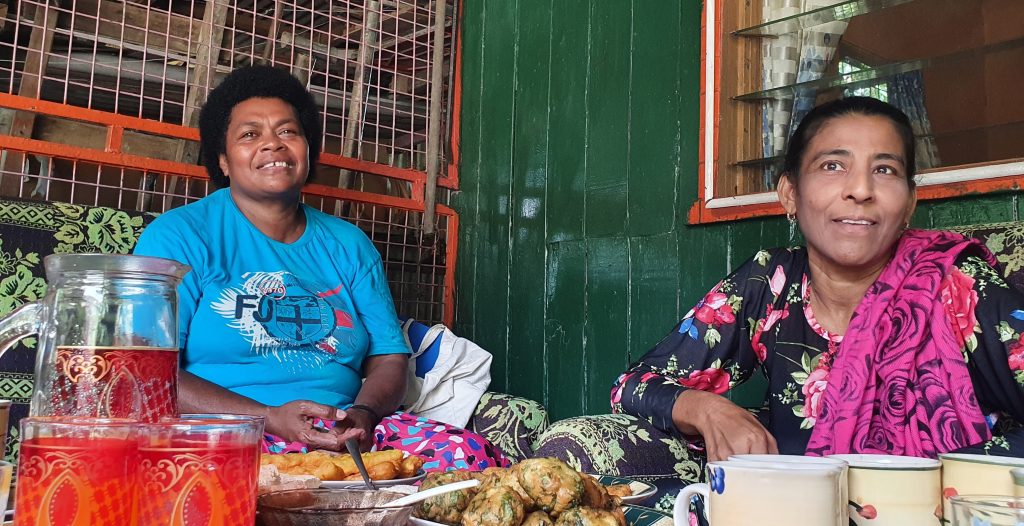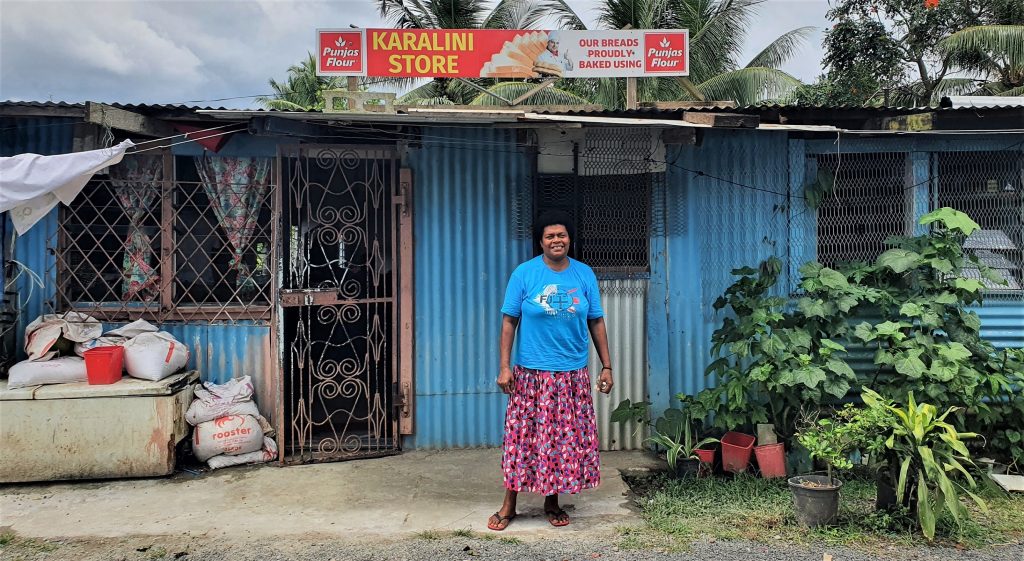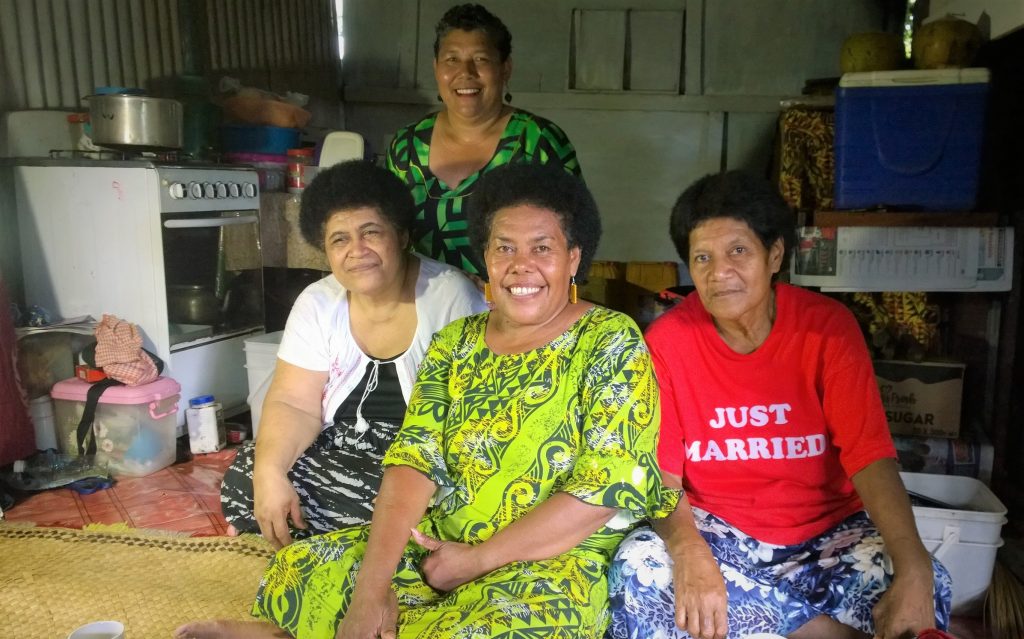Karalaini operates a small canteen from her home in one of Fiji’s informal settlements where people do not know each other. She is grateful for the steady income and new family she has found. “I’m one of the lucky women because I was one of this group,” she says. Photos: CWS/Kathlene Soo and Rob Wayne.
Fiji was hit hard by Covid-19. Over the course of a few months, many jobs and livelihoods disappeared. People had to rely on government payments and, for many families, the food rations distributed by our partner the Social Empowerment and Education Programme (SEEP). During the pandemic, SEEP trialled a new Local Economy programme in the informal settlements, designed to improve the livelihoods of vulnerable families, improve food security and strengthen local democracy.
Karalaini and Firoza were two mothers who struggled even before Covid-19. Their fortunes changed after participating in SEEP’s first business training programme. The women now run flourishing Minimarts out of their homes. Before starting these canteens, Firoza could not afford the medical dressings for her infected legs. She had difficulty walking but now with regular attention they are slowly healing.
To fund her children’s schooling, Karalaini used to sell pastries. She could not do this during lockdowns, leaving the family with little money. “I’m one of the lucky women,” she says.
At the end of the training, SEEP provided stock for the canteens which was initially set up as a five women cooperative. These two women continued and have made their canteens a success. They have grown in confidence and successfully lobbied for street lighting to help protect their community.
 Firoza (right) and Karalaini are business partners and now firm friends. They run canteens from their own homes and say the opportunity provided by SEEP makes them happy. Firoza says they can now “put food on the table and money in our pockets.”
Firoza (right) and Karalaini are business partners and now firm friends. They run canteens from their own homes and say the opportunity provided by SEEP makes them happy. Firoza says they can now “put food on the table and money in our pockets.”
“The money I received helped me and my husband send my kids to school. Thank you very much for the support. Thank you very much for the love that we share, and now I can say we are family,” says Karalaini.
The Place of Informal Settlements
The Suva-Nausori corridor is home to 117 of the 172 informal settlements in Fiji. People find their way to the settlements and may move frequently. Living conditions are poor and in some areas, there is regular flooding. Community life can be limited compared with the more stable life in the villages. The settlement where Firoza and Karalaini live spreads along a back road where homes are constructed from corrugated iron and salvaged materials. Some people squat, others pay rent for a shelter or lease land.
At another settlement outside of Suva, four women run a Cooperative. Kathlene and Rob from the International Programmes team said the women struggled to keep back the tears when describing life before the canteen. Their husbands lost jobs, one lost her son and they struggled to provide for their families. “We hold hands and work together and remember why we do this canteen,” says Chimima (left).
Local Economy Projects
After delivering supplies through the pandemic, SEEP staff began to explore options for addressing the deep poverty they found in these settlements. Staff saw that canteens would provide good income for the women, fair-priced basic supplies and a gathering place for residents. It wants to establish two more canteens in the settlements and three in the rural areas where there is keen interest. With a stronger village structure, SEEP plans to train 10-15 of the more vulnerable women from local women’s groups to run each cooperative. The canteen will encourage a greater sense of solesolevaki or community and provide opportunities for women to have a greater say in village affairs.
Fiji Emergency Responses
Thank you for supporting the Coronavirus Appeal. In Fiji it provided emergency rations for some families as well as funding the pilot for this Local Economy programme. Donations also replaced an outboard motor to enable people and goods to travel to and from markets in rural Nagone ni Colo by boat.
Staff members, Kathlene and Rob, were warmly welcomed by Nakawakawa villagers when they visited last November. The Tropical Cyclone Appeal funded 5.8 kilometres of water pipes connecting a newly constructed dam to two large water tanks in the village. These tanks now supply constant water to each house and the school, saving the community from multiple daily treks to get water or hours waiting for the one tap that supplied the 75 households. SEEP distributed roofing iron, water pipes, food and medical supplies after the cyclone in 2019. The villagers performed songs and dances to express their deep gratitude for your support.
Make a lasting commitment to mothers like Karalaini and Firoza with a monthly donation.
As a Partner for Life you can support some of the world’s most vulnerable people to get access to water, food and justice every day. Your regular donation will strengthen and build resilient families and local communities.
Please consider becoming a CWS Partner for Life. Help mothers around the world put good food on the table every day.
Find out more or sign up here.
Your support for the Summer Appeal will bring joy to women in five villages and settlements. You can give them the opportunity to start a small canteen like Karalaini and Firoza did. Instead of hiding at home, unsure where their next meal is coming from, women will become confident business owners. The local community will be empowered to raise issues that matter to them and benefit from lower prices. Children can go to school and families will be healthier.
Please support the Summer Appeal to improve family livelihoods.
$94 will fund the business registration.
$144 will help fund business training and
$471 support for one cooperative for each woman’s share of stock for the canteen.
Please donate today.
Read more Stories of Hope
from our Partners working to make change for some of the people who need it the most.




